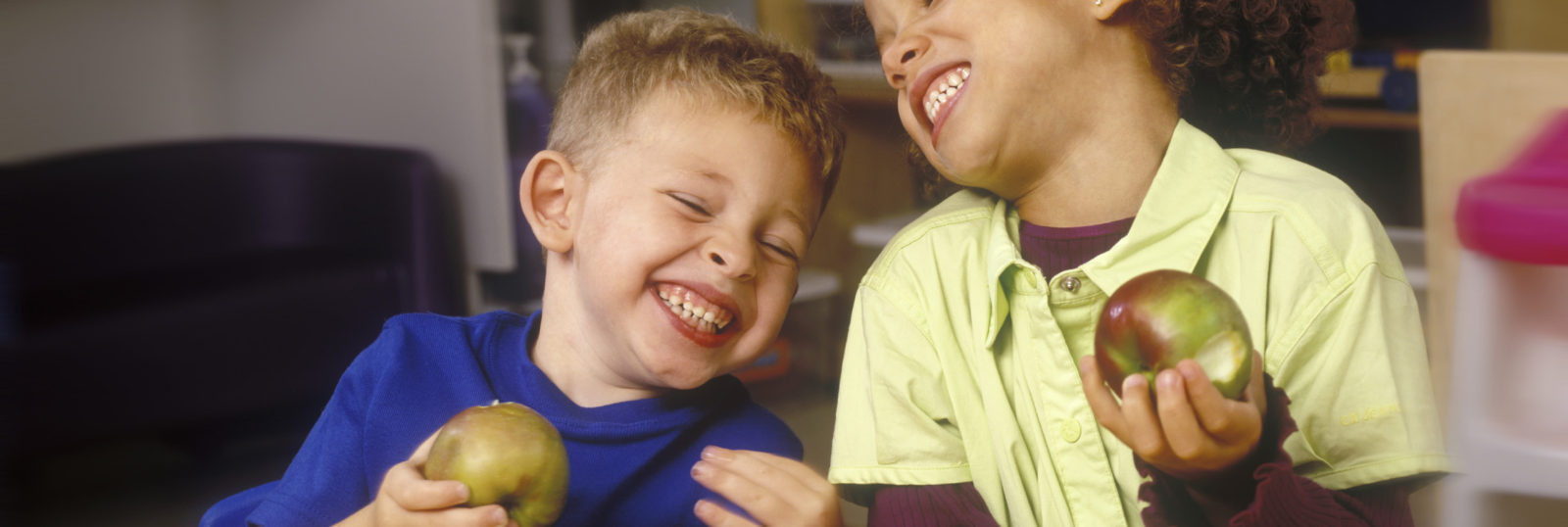Leaving the house with toddlers is a challenge. There is the clothes and shoes debate, which and how many accessories (toys, dolls, strollers, etc.) they can bring, and, of course, the requisite packing of the snacks. As parents of toddlers know, the moment they leave the house, toddlers are hungry. Starving, in fact. This scientifically proven,* magically enabled fact extends further, making food taste better outside the kitchen, preferably on the way to or home from the park.
Exasperated joking aside, snacking can have a serious, long-term impact on your child’s health. Establishing healthy snacking habits at a young age can have profound and lasting effects, long after the magic of snacking-on-the-go dissipates.
To be clear, snacking can be an important part of healthy diet. Healthy eating promotes learning and academic success as well as works to prevent chronic diseases like cardiovascular disease, type-2 diabetes, cancer, obesity and osteoporosis.1 In fact, diabetes can progress faster in kids than in adults, and it’s also harder to treat.2
But poor snacking habits can lead to exactly these types of chronic diseases. According to the Center for Disease Control and Prevention, the rate of childhood obesity is alarmingly high: nearly 9 percent of 2-to-5-year olds, 17.5 percent of 6-to-11-year olds, and 20.5 percent of 12-to-19-year-olds are considered obese, that is, a body mass index (BMI) at or above the 95th percentile for their age group.3
It is not only that American kids snack too frequently; it is that the foods they snack on are poorly chosen and nutrient-deficient. Nearly 30 percent of the calories kids consume are from fatty and sweet snacks, with another 10 percent of their daily caloric intake from beverages alone.4 One study of preschoolers and kindergarteners found that their BMI went up in the summer months, indicating that food choices at home play a major role.5
You can help establish lifelong smart snacking habits for your child, such as by:
- Offering meals and snacks at predictable times throughout the day;
- Limiting or avoiding sweetened beverages, including fruit juice. The American Academy of Pediatrics recently revised its recommendations regarding fruit juice and children, discouraging children under one year old from consuming any fruit juice at all, and limiting it to just four ounces for kids aged one to three;6
- Discouraging mindless munching; don’t allow children to eat in front of screens (same rings true for adults);
- Saying no to snacks before mealtimes (promise—they can wait another fifteen minutes before dinner is ready);
- Make snacks that are both dense and varied in nutrition; this way snacking not only adds to your child’s nutrient intake but also crowds out the fattier, sweeter, nutrient-deficient foods. Check out the list at the bottom for some ideas.
Like all habits, snacking can be challenging to change, for both kids and adults. Saying no to constant and unhealthy snack choices, as well as buying and preparing more healthful snacks may not be easy at first. But the benefits go beyond your kid’s health today to help ensure a whole lifetime of wellness.
10 Toddler/Preschool Snack Ideas
- Rainbow fruit kabobs: strawberry quarters, cantaloupe chunks, banana slices, green grapes, blueberries, and purple grapes on a stick
- Apple “cookie:” round apple slices with seed or nut butter topped with raisins
- Homemade trail mix: dried fruit (juice sweetened), dry roasted nuts, and whole grain cereal
- Fruit and yogurt parfait**
- Guacamole with baby carrots, grape tomatoes, and whole grain chips**
- Peanut butter energy balls
- Blueberry and Swiss chard smoothie**
- Hummus or greek yogurt “ranch” dip with celery, cucumbers, baby carrots, peppers, or whole grain pita**
- String cheese with grapes and peppers
- Banana “ice cream”
* Not scientific at all and based entirely on anecdotal evidence. Still true, though.
** Get the recipe in our Kids in the Kitchen ebook!
References:
- http://jandonline.org/article/S2212-2672(14)00604-2/pdf
- http://www.nejm.org/doi/full/10.1056/NEJMoa1109333?query=featured_home&
- https://www.cdc.gov/obesity/data/childhood.html
- http://www.todaysdietitian.com/newarchives/0416p8.shtml
- https://www.ncbi.nlm.nih.gov/pmc/articles/PMC1829359/
- https://www.aap.org/en-us/about-the-aap/aap-press-room/pages/American-Academy-of-Pediatrics-Recommends-No-Fruit-Juice-For-Children-Under-1-Year.aspx

